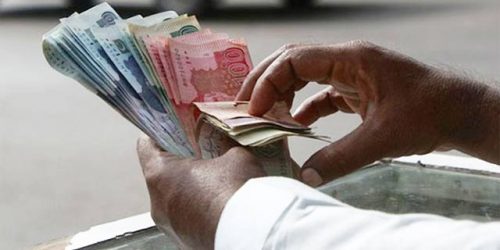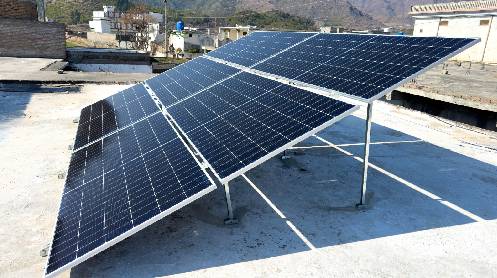ISLAMABAD:
Pakistan has rationalised its investment expectations from the Gulf nations under the Special Investment Facilitation Council to $27 billion in five years, as it also hopes to clinch some new deals during the upcoming visit of Chinese Prime Minister Li Qiang.
However, the exact number of agreements and memorandum of understandings that Pakistan hopes to sign during the Chinese prime minister’s visit has not yet been finalised. The Ministry of Foreign Affairs has shared a list of about 41 possible deliverables for the visit.
Work on the list of possible deliverables during the visit of Chinese Prime Minister Li Qiang is still in progress, Planning Minister Ahsan Iqbal said on Thursday. He was responding to a question during an interaction with media persons.
A day earlier, Iqbal took an exception from the Foreign Ministry’s decision to finalise the CPEC deliverables for the Chinese Prime Minister’s visit without taking him into confidence. Iqbal on Wednesday called a meeting of all the ministries concerned and grilled the representative of the Foreign Ministry. Tariq Fatemi, the Special Assistant to the Prime Minister, also supported the planning minister’s view.
It will be the first visit by any Chinese prime minister to Pakistan during the past 11 years. Prime Minister Li Qiang would arrive a day before the scheduled mid-October meeting of the Shanghai Cooperation Organization (SCO) Summit.
Under Phase-I, both sides have completed 38 projects worth $25.2 billion. About 26 projects worth $26.8 billion are in the pipeline and many of those have been included in CPEC Phase II.
The sources said that Islamabad has proposed about 41 deliverables for the Chinese Prime Minister visit and out of those about 17 were at the advanced stage, which can be finalized and achieved subject to Chinese consent.
Among these is a Cooperation Plan on the upgraded version of CPEC in line with China’s Belt and Road Initiative. Pakistan has also shortlisted achieving financial close of Kohala hydropower project, Azad Pattan hydropower project and Gwadar coal power project.
There is a proposal that Pakistan should enter into an agreement for Chinese acquisition of blocks for offshore oil and gas exploration and sign an agreement on the construction of Breakwaters at Gwadar port. Pakistan also wants to revise an agreement for the avoidance of double taxation and prevention of fiscal evasion. It has been trying to revise this agreement since 2021.
However, China is not willing to sign an MoU on coastal tourism development at Gwadar.
Pakistan has also proposed an agreement on establishing a sister port relationship between the Karachi Port and the Port of Shanghai.
Pakistan has proposed to inaugurate and sign the handing over of New Gwadar International Airport. There is also a proposal to sign a commercial financing agreement for the first phase Karachi-Hyderabad of the Mainline-I project. Pakistan has not yet shared a draft of the Financing Commitment Agreement with China, said the government officials.
Pakistan hopes to sign a loan agreement for the realignment of the $2 billion worth Thakot-Raikot project of the Karakoram Highway. China is currently reviewing the draft loan agreement and Islamabad is expecting a breakthrough during the PM’s visit.
Pakistan and China may sign a currency swap agreement, as the draft has already been agreed by the People’s Bank of China and the State Bank of Pakistan. This will be a major milestone of the PM’s visit.
Pakistan has requested signing protocol on quarantine requirements for export of Donkey meat to Beijing. There is a high possibility of signing this pact, as the draft has already been agreed. An agreement on co-production of television programmes is also expected to be signed.
There is also a possibility that Pakistan and China may finally sign the minutes of the 13th Joint Cooperation Committee of the CPEC meeting, which was held in May this year. Pakistan has also proposed to sign the minutes of 11th joint working group on transport infrastructure and the 7th joint working group on Gwadar meetings.
Among the high probable deliverables are handing over of certificates of smart classrooms at 100 universities in Pakistan and digitalization of terrestrial network projects.
Pakistani authorities also want to sign the China Pakistan Education Exchange Implementation Plan and agreement between the National Cultural Heritage China and Heritage Division of Pakistan.
It has shortlisted finalisation of four road projects – the DI Khan Zhob road, Mirpur Muzaffarabad Mansehra road, Karachi-Hyderabad Motorway project and Babusar Top tunnel project. During the PM’s visit, there is a possibility that four technical working groups to finalise the terms of references for feasibility studies might be constituted.
The loan agreement for Pakistan Space Center is also proposed by Pakistan but it may not be part of the final deliverables. There is also a proposal for a Framework Agreement for Eastbay ExpressWay phase-II project.
Pakistan expects to sign at least 18 Memorandum of Understanding – a non-binding document – in the areas of joint support for laboratories, cooperation in information technology, cooperation on livelihood working groups, cooperation on water conservancy facilities and flood control and calamity reduction.
The list of MoUs include technical training for the operation and maintenance of hydropower projects, cooperation between COMSATS University Islamabad and Nanjing University of Science and Technology, MoU between China Media Group and Ministry of Information, MoU on mining of non-ferrous metals, MoU on joint study for the future development of Thar Coal Blocks, and MoU on joint study for identification of potential sites for pump storage and hydropower project and MoU on advanced metering infrastructure.
There is also a proposal to sign a MoU on strengthening of artificial intelligence projects.
SIFC investment
Iqbal said that Pakistan was now expecting to receive $27 billion in investment from the Gulf countries. He said that Islamabad has already shared the proposed projects for these investments with Saudi Arabia and the United Arab Emirates. These investments would be made over a period of next five years, he added.
In November last year, the secretary to SIFC’s Apex Committee, Jehanzeb Khan said that Pakistan was expecting $70 billion investment under the SIFC in three to five years. The $70 billion investment would mostly come from private investors and the foreign governments-led investment would be through sovereign wealth funds, Khan had said about a year ago.
He had also said that Saudi Arabia had promised to make an investment of $25 billion through its sovereign fund but it would take time before the investment could materialise.
The investment would start trickling in once there was an overall improvement in the situation and foreign investors completed their review of certain policies, including the green field investment policy, said Khan a year ago.
Now the government has adjusted its expectations to $27 billion total investment under the SIFC in five years after it could not receive any investment in the past almost one-and-half-year.
But the SIFC officials say that “whatever SIFC has so far achieved, it could not be done in the past many years. The SIFC has facilitated approval of the uniform right of way charges policy, national framework for telecom infrastructure sharing, advisory committee for the auction of telecom licences, land information management system, a solar captive power plants project, 1,000 acres of land for cultivation in South Waziristan and a visa policy.





